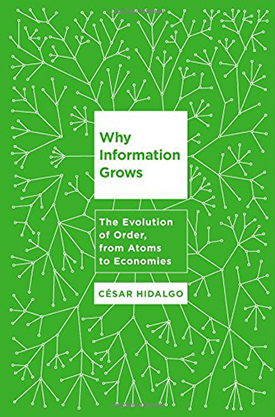
Why Information Grows:
The Evolution of Order, From Atoms to Economies
Cesar Hidalgo
An interdisciplinary theorist, Cesar Hidalgo, the Macro Connections group leader at the MIT Media Lab, invites us to understand the economy in an entirely different way.
In the wake of the 2008 recession, an outpouring of books—for example, J.K. Galbraith’s The End of Normal: The Great Crisis and the Future of Growth (2014)—has criticized the insularity of economists and their unwillingness to expand the discipline’s perspective. Now comes Hidalgo (co-author: The Atlas of Economic Complexity: Mapping Paths to Prosperity (2014) with a lens wide open. Drawing insights from chemistry, history, biology, anthropology, economics, and sociology, he urges us to see economic growth as “the social manifestation of the growth of information,” “information” defined not as meaning but rather as physical order. Hidalgo’s nontraditional approach requires careful definition of a number of words—e.g., “knowledge” and “knowhow,” “entropy” and “computation”—and occasionally a new vocabulary (the awkward but useful “personbyte” and “firmbyte”). In the world as Hidalgo sees it, a Bugatti is “an uncommon configuration of matter” whose value (new vs. crashed) depends entirely on the configuration of atoms. As he progresses from atoms to economies, Hidalgo offers a variety of startling insights about physical objects as the embodiment of information; about whirlpools as “information rich”; about markets as incarnations not of riches but of wisdom; about the limits of once-productive networks like Ford’s River Rouge; and about the perilous consequences of a social group’s isolation. He explains why the human capacity to crystalize wisdom is “geographically speckled”; why modern products no longer remain strongly associated with particular regions (Champagne with France, clocks with Switzerland); and why a trip through the birth canal is akin to time travel.
Some readers, perhaps economists especially, will construe Hidalgo’s widely allusive musings as dotty dispatches from Jonathan Swift’s Laputa; others will delight in his novel, holistic take on the dismal science.
Articles
3 Questions: Economies as computers, products as information | MIT News
How the Computational Capacity of Economies Explains Income | Huffington Post
How Much Information Can Earth Hold? | Scientific American
Events
6/8, 12:20pm: Cesar Hidalgo interviewed by Geoff Mulgan
6/4, 1:00pm: Cesar Hidalgo speaks at RSA House
7/2, 7pm: César Hidalgo at Harvard Book Store
Reviews
Multiplier effects | The Economist